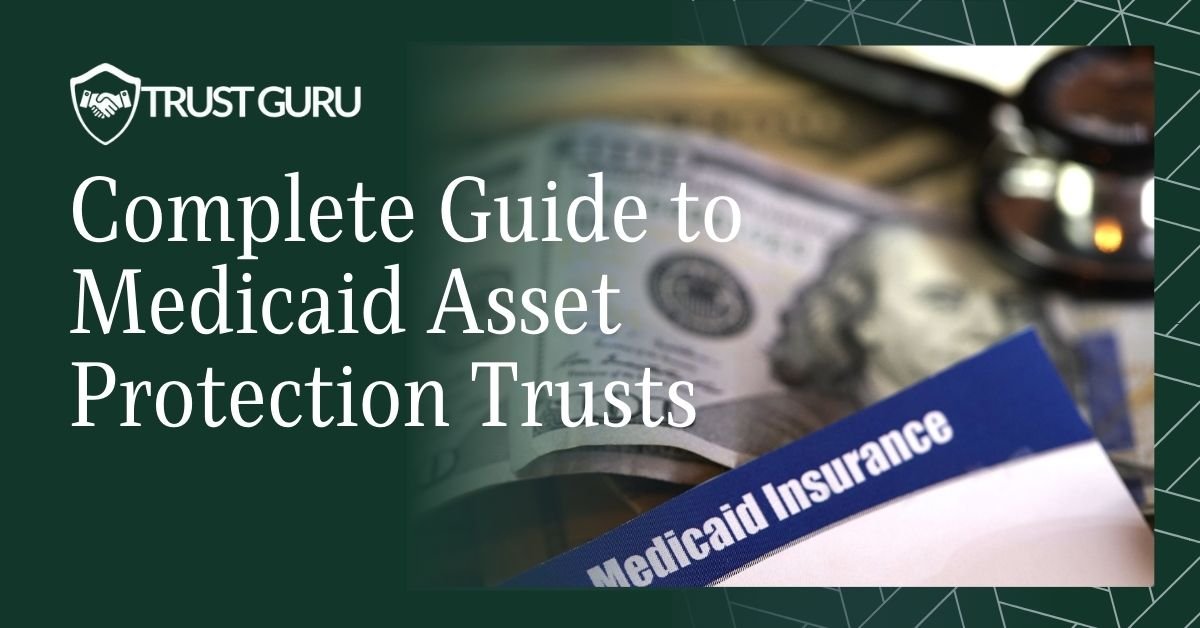Planning for long-term care and protecting your assets can be complex, especially if you’re considering a Medicaid Asset Protection Trust (MAPT) as a strategy. This guide from Trust Guru provides everything you need to know about Medicaid Asset Protection Trusts, including their benefits, limitations, and key requirements.
We’ll explore critical aspects like the five-year look-back period, loss of control over assets, potential tax implications, and the administrative steps involved, helping you make informed decisions to protect your wealth and legacy.
Article Preview:
- Understanding Medicaid Asset Protection Trusts (MAPTs)
- Why a Medicaid Asset Protection Trust Might Be Right for You
- Complex Qualification Requirements
- The Five-Year Look-Back Period
- Loss of Control Over Assets
- Irrevocability of the Trust
- Potential Tax Implications
- Difficulty Accessing Trust Assets
- Administrative Costs and Legal Fees
- Is a Medicaid Asset Protection Trust Right for You?

Understanding Medicaid Asset Protection Trusts (MAPTs)
A Medicaid Asset Protection Trust is a legal tool designed to help individuals qualify for Medicaid while protecting their assets. Unlike standard trusts, a MAPT is specifically structured to shield assets from Medicaid spend-down requirements, preserving wealth for future generations or a spouse.
Once assets are placed in a MAPT, they are typically inaccessible to the grantor for personal expenses, but they remain safe from Medicaid’s reach, provided the trust meets specific conditions. For more information on our asset protection trust services, visit Trust Guru.
Why a Medicaid Asset Protection Trust Might Be Right for You
A Medicaid Asset Protection Trust offers significant benefits, especially for individuals aiming to preserve their estate for loved ones while potentially qualifying for Medicaid. Here are a few key advantages:
- Preserves your assets for heirs without interfering with Medicaid eligibility.
- Protects assets from Medicaid spend-down requirements for long-term care.
- Allows flexibility in distributing your wealth according to your wishes.
If you’re also interested in other protection strategies, explore our business and personal asset protection services for options that may complement a MAPT.

Complex Qualification Requirements
One of the main challenges of setting up a Medicaid Asset Protection Trust is understanding the qualification requirements. Medicaid eligibility rules are intricate, with different regulations depending on the state. Common eligibility factors include:
- Age and health requirements: Medicaid typically serves seniors and individuals with specific medical conditions.
- Financial criteria: Applicants must meet strict income and asset limits.
Trusts need to be established with precise legal language to meet Medicaid’s requirements, or they risk disqualification.
The National Council on Aging provides a detailed guide on Medicaid eligibility requirements, including income and asset limits, which is crucial for understanding qualification criteria.
Trust Guru offers comprehensive legal compliance and structuring services to ensure that your trust setup aligns with all Medicaid requirements.

The Five-Year Look-Back Period
Medicaid enforces a five-year look-back period on asset transfers. Any assets transferred to a MAPT within this time can be subject to penalties and delay Medicaid eligibility. Here’s how it works:
- Transfer penalty: If you transfer assets to the trust within five years of applying for Medicaid, it may result in a penalty period where Medicaid benefits are withheld.
- Planning timeframe: Start the MAPT process well before you anticipate needing Medicaid coverage.
The official Wolter Skluwer website provides detailed information on asset transfer rules, including the five-year look-back period and penalties for improper transfers.
For assistance with navigating the look-back period, consider consulting Medicaid asset protection services provided by Trust Guru.
Loss of Control Over Assets
Once assets are placed in a Medicaid Asset Protection Trust, the grantor generally relinquishes control. This means:
- You can’t access the assets for personal expenses like daily living costs or leisure activities.
- Asset management shifts to a designated trustee, typically a family member or trusted advisor.
While this might feel like a loss of financial control, it’s essential to remember that these assets remain protected for your beneficiaries.
The Centers for Medicare & Medicaid Services (CMS) outlines the Medicaid Estate Recovery Program, explaining how states can recover costs from a beneficiary’s estate.
Trust Guru offers trustee services to help clients appoint trustworthy individuals to manage their assets responsibly.

Irrevocability of the Trust
Most Medicaid Asset Protection Trusts are irrevocable, meaning they cannot be altered or dissolved without beneficiary consent. This can be beneficial because it:
- Solidifies your commitment to asset protection: Assets in an irrevocable trust are fully out of the grantor’s control, offering stronger protection.
- Limits the risk of future financial disputes, as the assets and terms cannot be easily changed.
However, irrevocability can be restrictive if your financial situation or personal needs change, so it’s essential to consider whether this is a manageable commitment.
Our irrevocable trust planning services can help you weigh the pros and cons.
Potential Tax Implications
A Medicaid Asset Protection Trust may have various tax implications, particularly for beneficiaries. Consider the following tax factors:
- Capital gains taxes: Beneficiaries may incur capital gains taxes if they sell assets from the trust, especially if the assets have appreciated significantly.
- Income tax obligations: Trust income is often taxed at a higher rate than individual income.
Trust Guru can assist with tax compliance for trusts to help ensure beneficiaries are well-prepared for any potential tax responsibilities.

Difficulty Accessing Trust Assets
Once assets are transferred into a Medicaid Asset Protection Trust, it can be challenging to access them, even in emergencies. Here’s what you need to know:
- Trustees must adhere to strict distribution rules: Assets cannot be accessed for the grantor’s personal expenses.
- Emergency situations: To access trust assets, the grantor would need to coordinate with beneficiaries and adhere to the trust’s terms.
If retaining asset flexibility is essential, Trust Guru provides trust amendment and restatement services, which may allow for some adjustments while keeping your estate protected.
Administrative Costs and Legal Fees
Setting up and maintaining a Medicaid Asset Protection Trust can be costly due to:
- Initial setup fees: Creating a MAPT typically requires legal expertise to ensure compliance with Medicaid rules.
- Ongoing administrative expenses: Trustees may need to handle annual reports, tax filings, and other regulatory requirements.
Trust Guru offers reliable, cost-effective administrative support and trustee services, making it easier to manage your trust’s ongoing requirements affordably.

Is a Medicaid Asset Protection Trust Right for You?
A Medicaid Asset Protection Trust is not ideal for everyone. However, it can be highly beneficial for individuals with substantial assets who wish to qualify for Medicaid without sacrificing their financial legacy. If you’re considering a MAPT, think about:
- Your current health and financial needs: Are you likely to need long-term care soon?
- The size of your estate: Are your assets significant enough to warrant protection in a MAPT?
- Your comfort with financial control: Are you ready to relinquish control over the assets in your trust?
At Trust Guru, we help clients assess whether a MAPT aligns with their long-term goals and personal values, guiding them through each decision with personalized trust services.
Conclusion: Protect Your Future with Trust Guru
A Medicaid Asset Protection Trust can be a powerful tool for securing Medicaid eligibility while preserving your assets for loved ones. However, it’s essential to navigate the complexities of this trust carefully, from qualification requirements to potential tax impacts.
With Trust Guru by your side, you’ll receive knowledgeable, compassionate guidance through every step, ensuring your assets are protected and your legacy remains intact. Contact us today for assistance with any of your trust service needs, including creating a Medicaid Asset Protection Trust that aligns with your financial goals.











